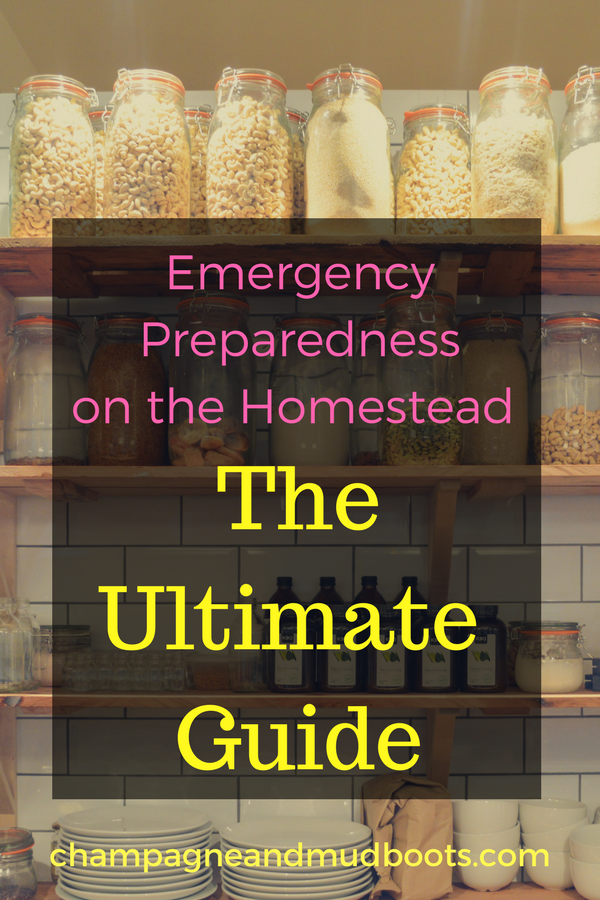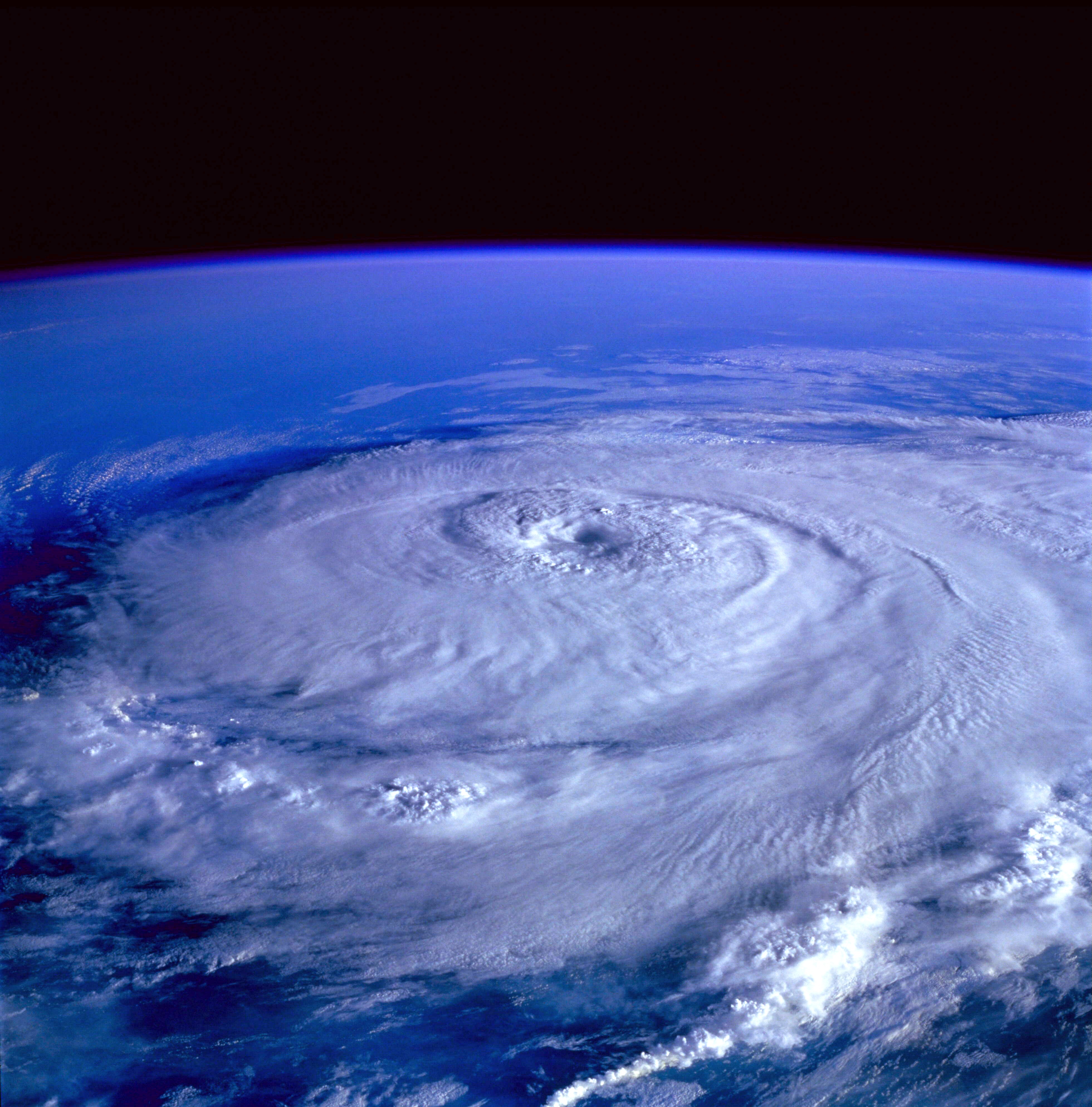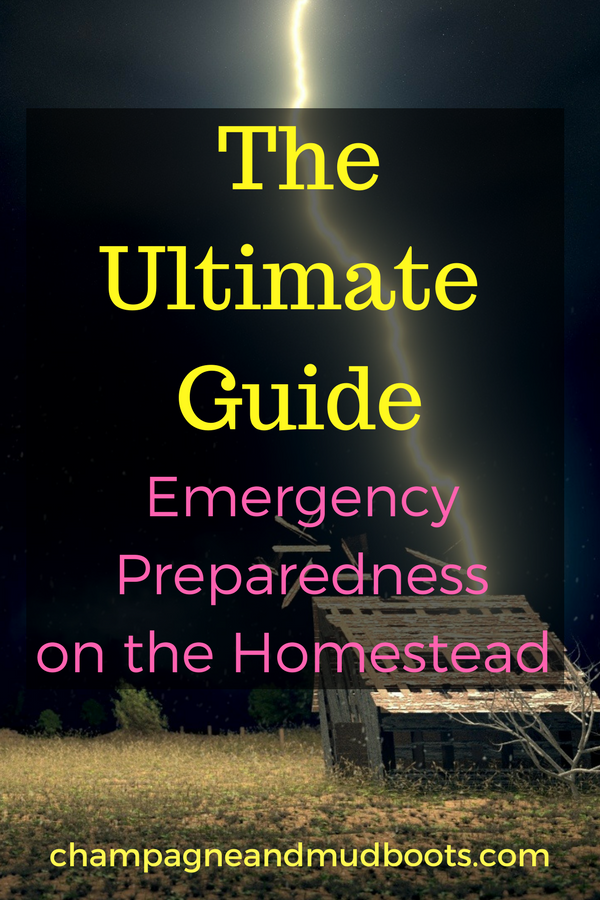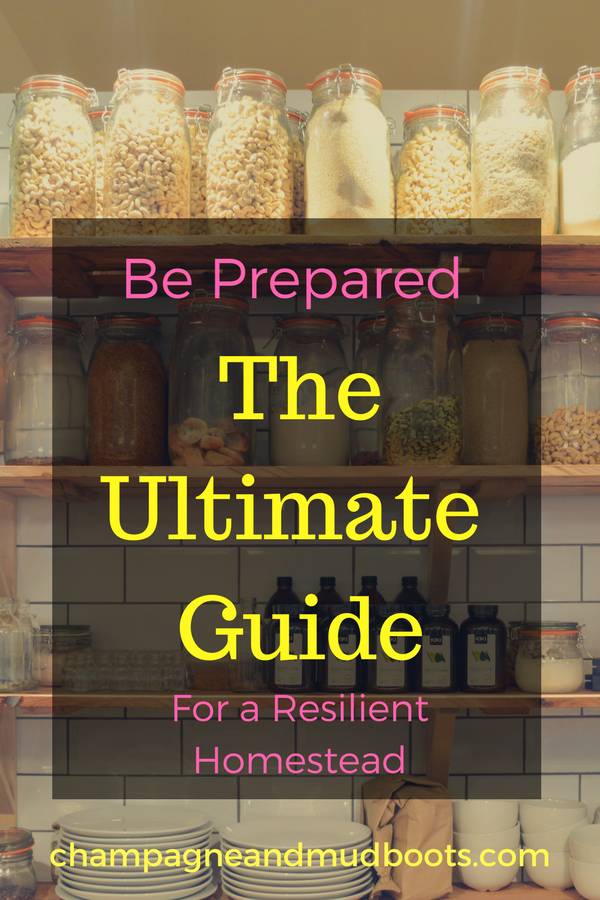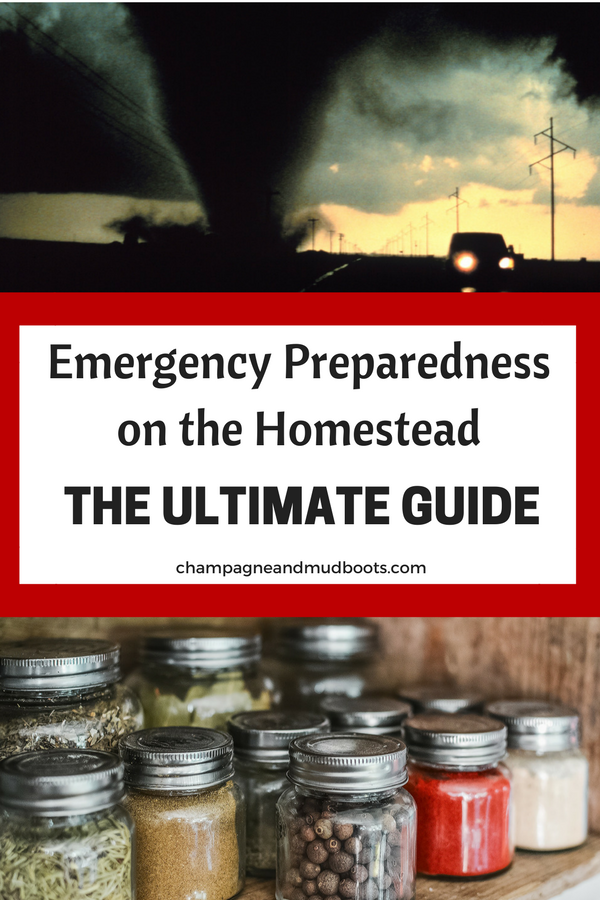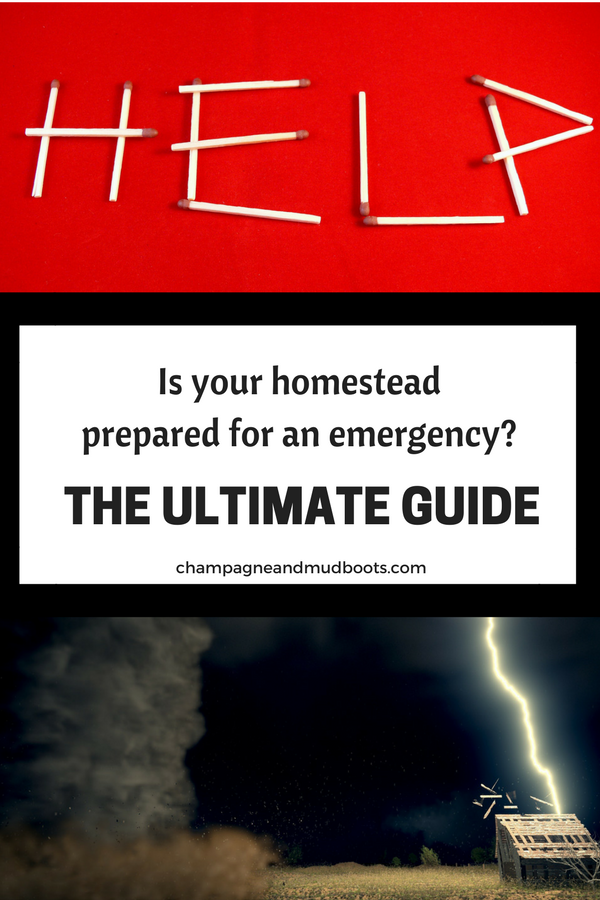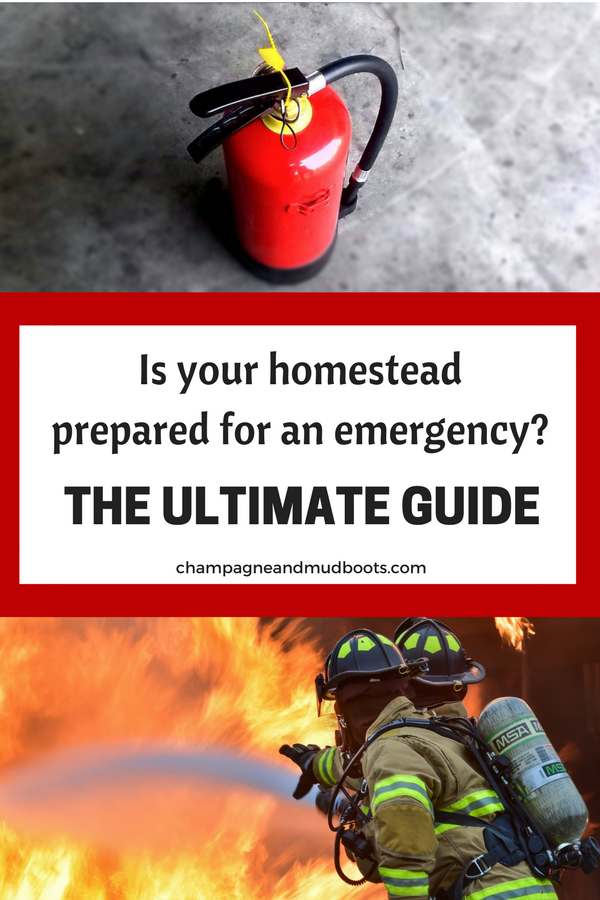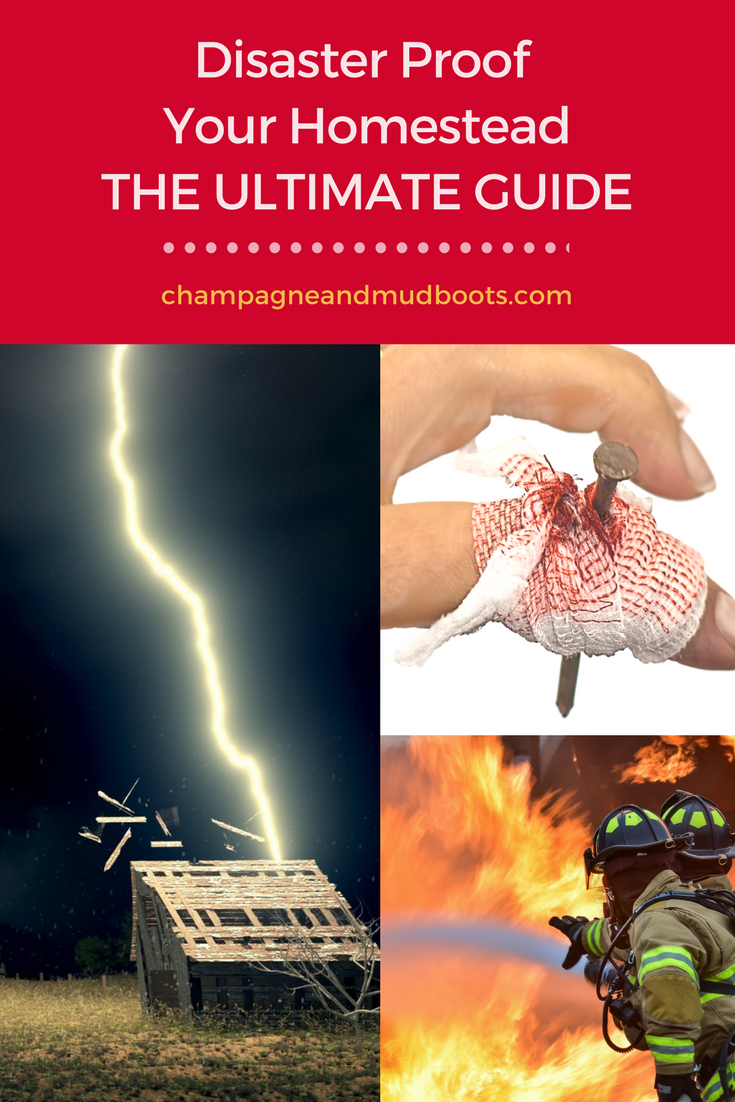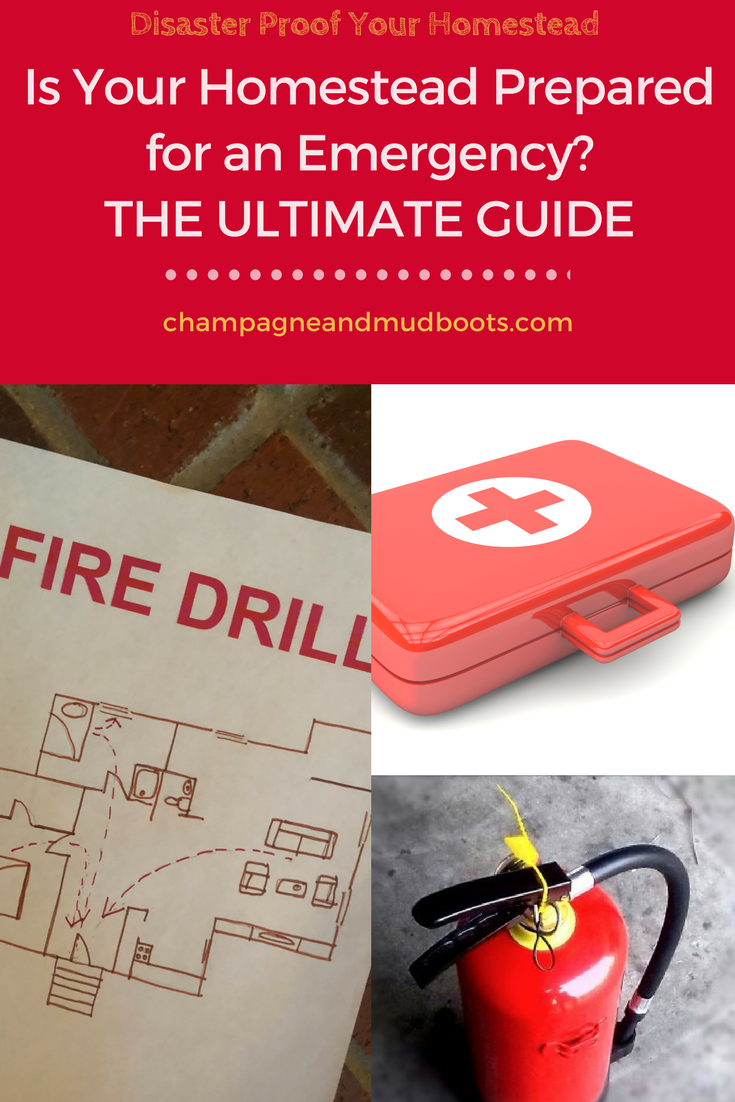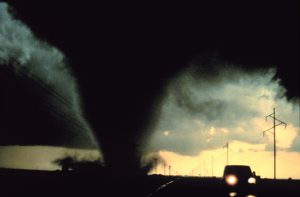
Emergency Preparedness. It’s kind of a heavy topic but is your homestead prepared for an emergency? I’m not talking about apocalyptic emergencies, a-la EMP or pandemic, but rather the everyday kind that can strike when you least expect it.
Many people stress over what they would do during a major disaster event.
But in reality, something like a sick family member or a job loss would prove just as devastating for a family. This kind of emergency is far more likely to happen, and giving some thought to these kinds of scenarios today can prevent an emergency from turning into a disaster tomorrow.
The secret to alleviating the stress of these events is to plan ahead now! Knowing you have thought through all the emergency preparedness scenarios planning out what you can allows you to relax and enjoy life. You can’t control everything but you can definitely mitigate how much it will affect you.
If you are a homesteader and anything like us, it seems as if there is never enough time to complete all the projects, ideas and tasks that are needed to keep the homestead functioning. Some days it can feel like a chore to just keep your head above water!
However, there are some easy plans you can set into motion that will help disaster-proof your homestead. We will begin by thinking about basic needs and then branch out to more specific needs. As I was writing this post I realized that there is a lot of ground to cover so I’ve divided it into a series of posts to make it a little more manageable.
Prep 1: Water

So simple yet so important. Without access to clean water, you are dead and so are your animals. Water emergencies could be contaminated city water (re: surprise boil notice), contaminated well water, the well pump failing, or a seasonal drought. You need water not only to drink and prepare food with, but you also can’t flush your toilet without it.
For drinking water a good rule of thumb to start with is 1 gallon of water per person per day. Obviously, more is always better here but having at least a 3-7 day supply for everyone in the house gives a good starting point.
The Tap
Super simple but just keep some bottled water around the house. You can even reuse other bottles from soda, juice or milk if you have these and just fill from the tap.
Utilize Rainwater
Water collected in IBC containers can be used for crops, provide water for livestock, or even yourself if it is properly filtered. They make great emergency backups if your well goes down or you get a boil notice from your municipality.
Remember, these tanks need to be painted black or covered in black plastic to help prevent algae growth. They can be attached to gutters off the house, barn, or even chicken coops. Set them on cinder blocks at each corner to ensure water pressure when you draw from them.
We put a nice fence around ours as it’s not exactly an attractive backyard feature. However, this also created a convenient outdoor storage space. Make sure to leave room to remove the tanks for occasional cleaning and re-covering. There are many great YouTube videos on using IBC containers or ‘totes’ for rainwater harvesting.
Filtration
Using a Berkey water filter or a similar filtration system is a must to properly clean water during an emergency. The Berkey filter can even clean untreated water- hello IBC tank I’m looking at you! They will remove bacteria and viruses, chemicals, and can eliminate lead and mercury along with a host of other nasty things.
Rumor has it they will also turn fruit punch clear. They are great for everyday use too as a best practice for the best quality water possible.
Remember, even if you are on city water, they usually don’t send out the ‘boil water’ notices until after something has already gone wrong. Who knows how long there was an issue, how many gallons you drank, or how many people got sick before a problem was detected? Daily filtration helps stop that lag time and creates a buffer between who controls your water and you.
Pool
In a pinch, take a bucket of water from your pool to dump in a toilet tank to have flushing toilets, and dump into a filter like a Berkey for drinkable water. It may not be as perfect as a bottle of spring water off the shelf, but believe me, you won’t really care, and it’ll do fine.
Energy and Pressure
If you’re on a well, even if you have a rainwater IBC container backup, you need a plan if your well pump fails, or the grid goes down preventing the pump from turning on for an extended period. If you don’t have power, you don’t have pressure, which means no water out of your taps.
The ideal solution is to have a generator installed next to your well (natural gas, propane, or gasoline in that order). If your pump runs on 240VA electricity, this may be your only option, so start planning soon.
However, if you have a shallow water table and a pump that runs on typical 120VA electricity, you have at least one generator parked in your garage or sitting on your driveway already. It’s your vehicle.
Clamp a DC-to-AC inverter of appropriate wattage to your battery terminals, start your vehicle, plug in the pump, and you’re back in business. Just know what kind of pump you have on your well ahead of time to start planning this part.
Septic and Wastewater
What comes in must go out. What happens if you’re not able to flush toilets, or your septic system fills up in a grid-down scenario after a couple days? This can make for a serious hygenic issue for you and your family, especially if you have nowhere to go or are unable to leave easily. Most septic pumps run on 120VA electricity, so use the inverter tip above! Run it a couple times a day until the tank load has normalized- use your vehicle to prevent nasty stoppages!
Prep 2: Food
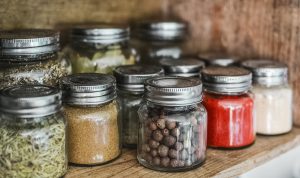
Second in emergency preparedness is food for you and your family. If you couldn’t go to the store for 2 weeks would you be ok? What if you lost your job and money was tight? Could you avoid spending money on groceries for 3 months while you’re looking for a new job? If you answered no to any of these questions you are not alone.
Deep pantry
The answer to this problem is the deep pantry. What is a deep pantry and how does a deep pantry make you prepared for an emergency? A deep pantry just means you have multiple of all the items you frequently use. You can start by making a list of the non-perishable items you frequently use and then each time you are at the store you pick an item to buy extra of on that trip.
After several months, you will begin to have a stockpile of food that will help keep you from both running out of items and making unexpected store trips and have a stash of food to work through if couldn’t physically or financially get to the store.
No MRE’s
Don’t go buy a bunch of rice or MRE’s. I mean you can live on that but it’s going to suck and it’s extra money. If eventually you get to a place where you want some of those things and you already have a deep pantry fine but it shouldn’t be first on the list. A deep pantry is money you were going to spend on food anyway, you just accelerated it a bit and if you are looking for sales on items you can increase your savings.
Food for your livestock and pets
The same stories apply. Are any of your livestock dependent on feed your buying from the store? What would you do if you couldn’t get ahold of the feed or couldn’t afford it for a period of time? Keeping some food in reserve at least gives you a buffer.
It is important to keep this food pest free during that time so it does not get ruined but having a spare bag can save you not only during an emergency but also prevents last minute trips to the store because you ran out of cat food! Ask me how I know this one?!?
Growing food for you
Start a garden. Here are 10 Simple Steps You Can Do Now to Create an Awesome Vegetable Garden. Sure, your first year you may not get that much food but each year you learn more and more and produce more and more food. This makes you less dependent on stores and supply chains for this vital resource. If you’re a beginner gardener don’t miss The Top 6 Mistakes I Made as a Beginner Gardener so you can avoid them and get more food, faster!
Growing Livestock Food
It may also be worth considering for livestock, particularly for birds on the homestead, if you can grow any of their food or have a sustainable system on the farm that helps provide for them. While potentially lowering feed bills this may become especially important if you couldn’t get feed at the store for them.
I’ve been hesitant to try this yet due to both time constraints and concerns about throwing off the balance of their diets with protein ratios and such. However, with some planning this could be a really good option. At the very least having some greens on rotation is worth considering.
. Evacuations are sometimes planned like a hurricane and other times local disasters can prevent you from getting home. We will finish up with a super important topic that most of us don’t like to think about too often- the health of ourselves and family members.
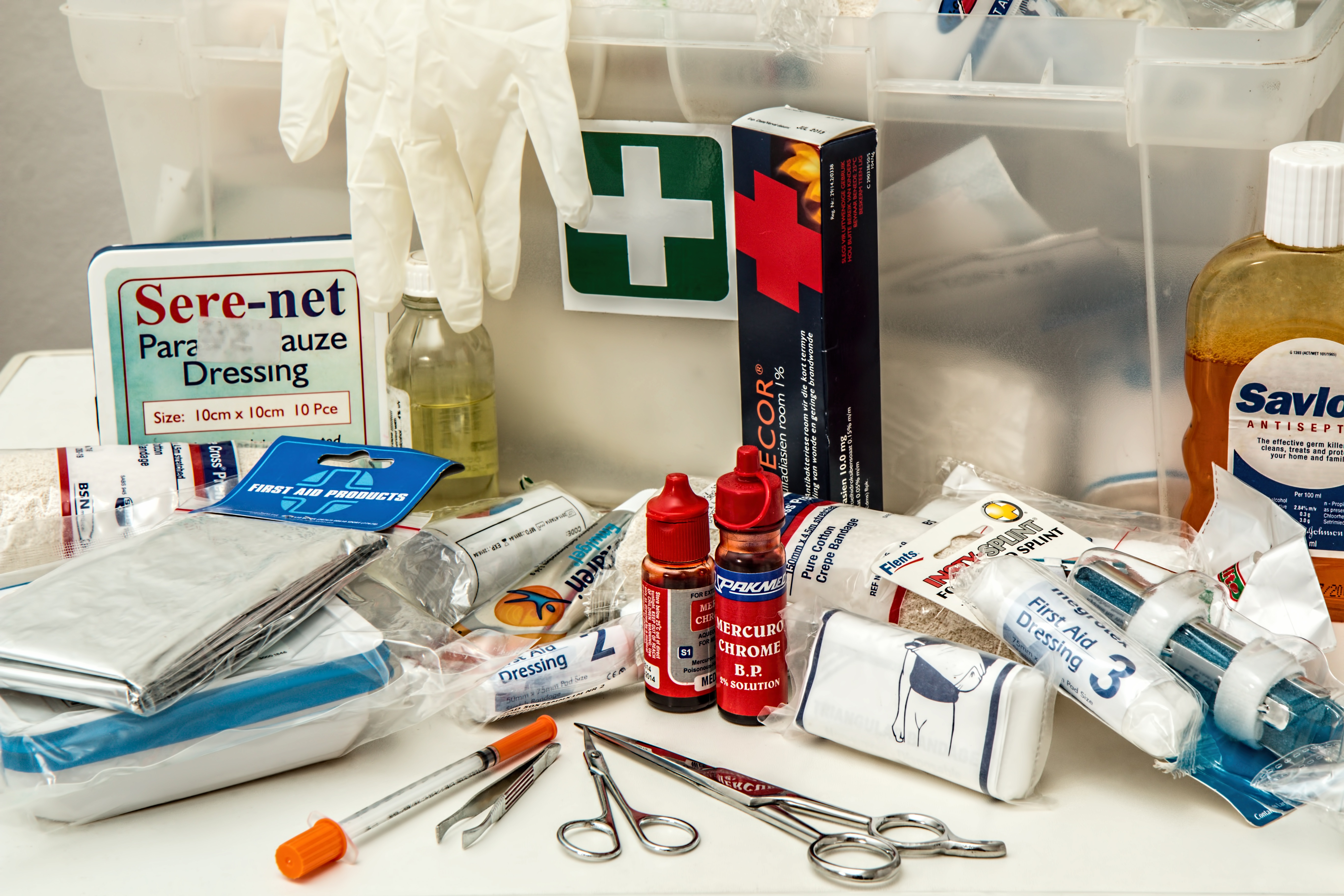
Prep 3: First Aid
First aid should always be included in emergency preparedness. You never know when you’ll need to utilize these skills whether it’s a major disaster or just a simple cut hand on the homestead.
You should have supplies handy if there was a weather event or other disaster that delayed first responders getting to you. The usual suspects of gauze, tape, band aids, disinfectant or pain meds certainly apply but so do books and some basic training.
What if you couldn’t get on the Internet? An old-fashioned book can certainly give instructions on how to place a splint. If you or someone in your family doesn’t have a medical background, a first aid course may be very helpful to provide some groundwork on what to do if the need arose.
Make sure everyone knows where medical supplies are kept in your home and vehicle. Don’t forget your car first aid kit as accidents can happen anywhere. Are they labeled and organized, yet out of reach of small children? The more organized you are with your supplies the faster you can get treatment to those in need.
Are you or anyone in your family on chronic medications? Keeping an extra supply can save you if you get snowed in for a week and can’t get to the pharmacy. By the same token, are your animals, livestock, or pets on any kind of chronic medications for diabetes, seizures, etc? The same philosophy applies here, too.
It can be challenging to have an extra supply of critical meds on-hand, but will be well worth it if the need arises. Look for over-the-counter and generic options that may be available to you.
Back to livestock and pet first aid. Keep gauze and vet wrap for your animals along with cleaning supplies for cuts and wounds. Don’t forget syringes for flushing wounds. Take stock of any sterile syringes and injectables you may need as well.
Do you have pain meds that are species-specific? This is another area where having an actual first aid book comes in handy.
Always have appropriate muzzles on hand for cats and dogs. Your pet may be sweet as pie under normal circumstances, but if injured and hurting it is only reacting out of pain.
I know I’ve wanted to bite a doctor before when they injected me with lidocaine, so I don’t expect a pet to have more patience under duress. There are also feline muzzles available that cover the eyes and mouth that can help when handling an uncooperative pet.
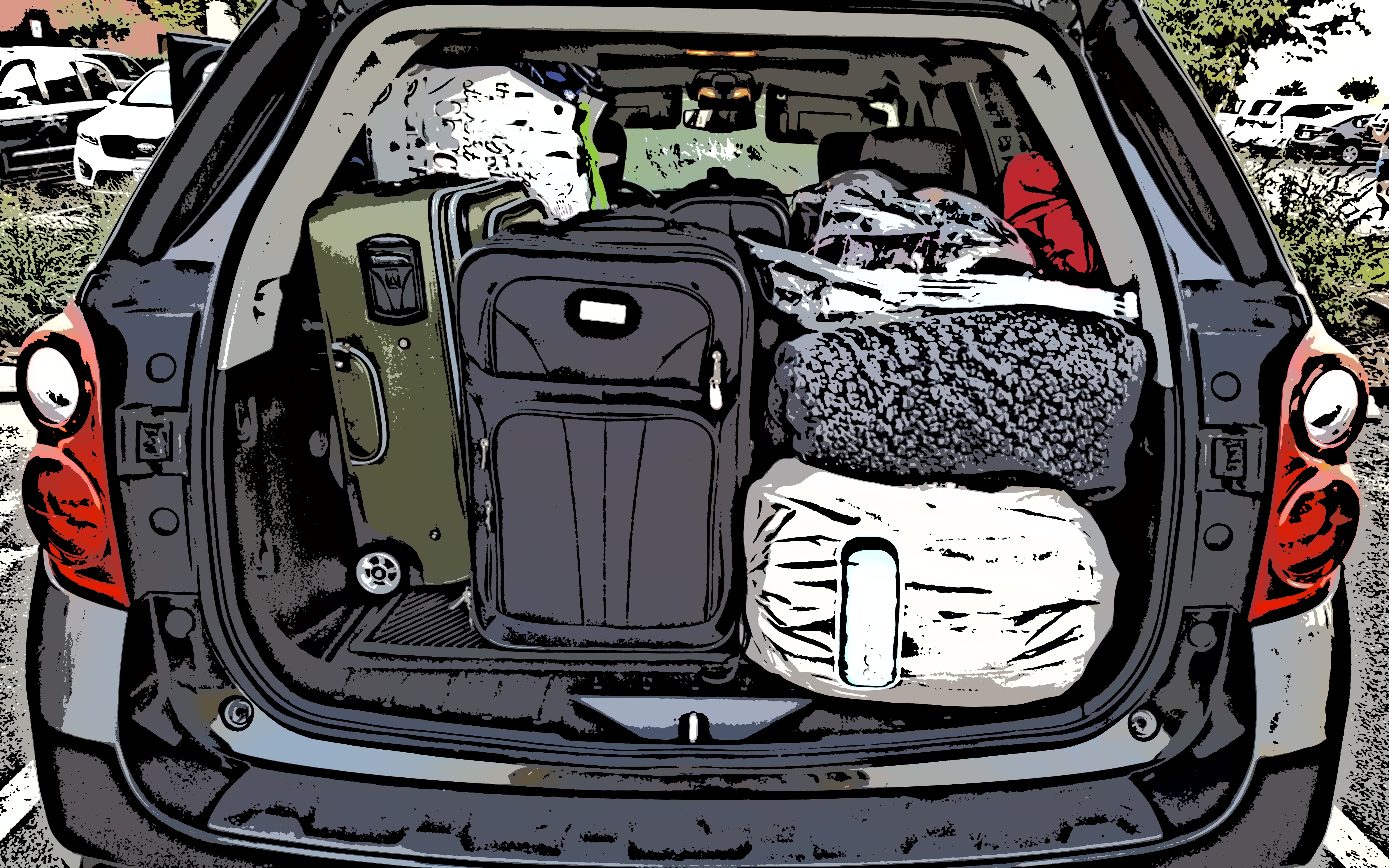
Prep 4: Quick! You Have to Evacuate!
What would you take with you? Do you need to take medications for you or your family? People talk about Bug Out Bags as if they are going to go off and live in the woods but this is soooooo not likely to happen. I, for one, am going to be pretty pissed if I ever have to be in such a situation!
You know what is likely to happen? Someone in the family is suddenly taken to the hospital and you have to follow. Or a train derails near you and you have to immediately evacuate your home for 3 days while they clean up the toxic mess. Ever tried packing for 3 kids for a family vacation? It’s kind of a beat down. Now imagine doing it in 30 minutes.
Life suddenly gets much easier or at least less crappy if you already have a bag packed that has clothes, snacks, and any needed items like a pair of glasses or contacts.
How would you move your livestock if you had to, or if you have to leave them behind, what could you leave for food and water? I saw an article during the California wildfires about a woman shoving her pony into an SUV. It worked, and desperate times call for desperate measures, but it helps to think through scenarios ahead of time.
All pets in the household should have carriers appropriate to their size. It is important to keep these in an easily accessible location where you can grab them and go rather than hunting around in the attic behind Christmas trees and old toys.
Did you know you can even train cats to go into a carrier willingly? Nothing says ‘good time’ like shoving an angry cat into a carrier, or a freaked out horse into a trailer! Training livestock and having a loading method for livestock will make the process much easier.
Anyone who has herded animals with a spouse knows what a marriage tester that is!!! Now image doing it while under duress and a time crunch! Keep this in mind the next time you load up to go to the vet, a show, etc. Rehearse it a couple extra times for everyone’s familiarity while you’re already at it.
Each person should know what the standard procedure is and what their specific job is to make it happen and make it as easy as possible on the animals. Practice lets everyone know their job and do it effectively.
In a scenario where it’s safe to be at your home but you have to be gone, such as for a sick family member, do you have someone you can call to take care of livestock for you even if for just a day or two until you return?
If it’s too difficult to explain on the phone (especially under duress), or you may not even be able to do so, plan to write up a few pages on what to do as documentation.
Think about it- three pages maybe covering food, water, medicine, paddock shifting, times, seasonal needs, etc. Printed, laminated, nailed to the wall of your feed room. A permanent reference is now there for anyone to walk in and take care of business.
Arranging with neighbors or friends beforehand to be of mutual support for these types of scenarios is a great idea.

Prep 5: What if One Family Member is Sick? Or Worse, Dies?
This is probably one of the more terrifying scenarios. No one wants to think about mortality, but it’s a necessity to think through details and make a plan. Do you have a will? If you have kids, do you have a guardian appointed in writing if something were to happen to you? Do you carry life insurance to help with costs if you were no longer here?
It’s so easy to want to divide tasks up on the homestead, but actively cross-training each other and sharing knowledge and how-tos in case one or the other is no longer around – or incapacitated – is crucial.
Do both of you know how to access any and all accounts for both personal and for any businesses pertaining to the homestead? Passwords and necessary accounts need to be in some type of master list in a secure location that applicable parties can get to. It’s a little mindboggling to think of how many passwords my husband and I have between just the two of us!
For security reasons, are you also occasionally changing passwords? I absolutely hate this one, as it’s hard enough to keep them all straight, but it is a better cybersecurity practice. And since my husband is an IT engineer, he frequently (and annoyingly…oops did I just type that outloud?!?) reminds me of this one…
Does everyone on the homestead understand and practice all livestock chores, and how to do them? Do you have that printed list with instructions that would make it possible for a farm babysitter to come in if needed and help you?
It just takes one surgical complication to take you from just one week laid up, to suddenly needing advanced care and a 3-4 month recovery. Could your homestead make it if this happened? Do you have multiple income streams or disability insurance that can fill in financial gaps?
Family illness and death considerations are probably the most important after food and water since it contains some of the most common disasters that can befall any of us. I can say without a doubt though, that getting our wills written was the biggest sigh of relief, especially since we have kids.
Once they were notarized, it was something I could just take off the list and not have to think about. And if you are anything like me, checking something big off the ‘to stress about list’ sounds awesome.
And here’s a modern plot twist. Do you own any cryptocurrency assets such as Bitcoin? If so, do you know how to access these funds if something happened to either of you?
Many of these currencies require multiple levels of sign-in authentication on specific devices (that are probably locked) to access the accounts, so going over where and how to control this is very important. Understand that if these accounts cannot be accessed, recovery is difficult by design and may be impossible. With fluctuations in the market it is difficult to say how important it will be but it could be a big deal if you hold these.
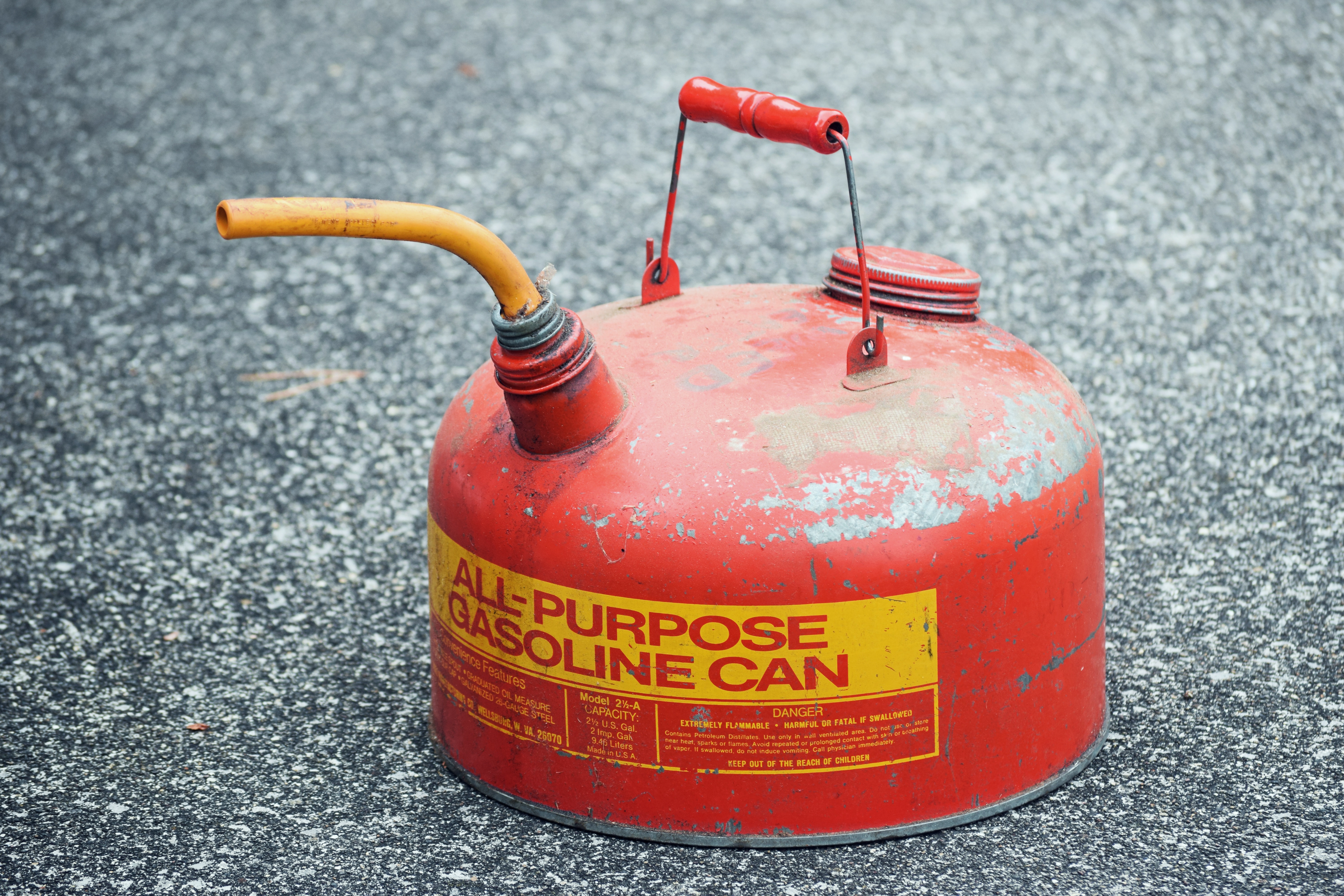
Prep #6: Electricity and Gas
You need a plan for when the lights go out. Generators and battery backup systems certainly fit the bill. But if your generator uses gasoline like most typical models we’re familiar with, you also have to store enough gas.
Stored gas not only runs the generator it also runs your cars. Anyone who’s run out of gas on the road or prayed to make it to the next gas station knows how important that details really is.
Maybe you’ll need a ‘propane pig’, one of the large hot dog looking tanks somewhere to help keep a propane generator going. If you don’t have one yet, consider a natural gas fired generator if this service is available to your area from a local utility.
Natural gas lines are usually the last thing to go down during outages. A natural gas generator, though more expensive, can help keep your whole home functioning normally.
Maybe you’re not ready to go out and buy a generator today, and maybe you don’t need to. Because most of us have at least one or a few already- they’re sitting in the driveway or garage.
Did you know your vehicle makes a great generator in a pinch with a simply device that costs $100 or less? Using an inverter clipped to its battery, you can turn the DC battery power into usable AC power for your home- just run some extension cords inside and start running your fridge and charging your devices.
You won’t be able to run everything, but you can keep your food cold and stay in communication with your vehicle idling outside. Consider all of your homestead’s power NEEDS (and maybe some wants if there’s room) when making this decision.
A good Whistler 1600w DC-to-AC inverter costs about $100 on Amazon. Use a Kill-A-Watt device that costs about $20 on there first to test and tally some appliances, laptops, lights, etc. to get an idea of your consumption requirements. By the way, a standard hair dryer uses 1875w…
Check out the great in-depth tutorials from energy guru Steven Harris with everything on how to make generators, inverters, and battery banks work for your homestead properly and safely!
Back to gasoline. If there is a gas shortage, it is much nicer to be able to pull gasoline from your own storage at home and wait calmly for supply lines to restore, rather than fighting the crowds waiting hours in line just to get a few rationed gallons. Don’t you think?
After Hurricane Harvey, the Dallas/Ft. Worth area had a run on gas- it wasn’t even a real shortage, just a panic buying frenzy. This resulted in shortages anyway and many were left scrambling to put gas in their cars just to get to work. As we saw, simple frenzies that go viral on social media can impact this issue just as much too.
It is very simple to just fill an extra 5-gallon gas can each month for one year, then cycle through them over the next year can-by-can, month-by-month, by using and refilling them. Dump the ‘March’ gas can into your empty tank in March, fill it back up at the pump and the rest of your car’s tank, then return the can to storage. You’ll do the same in April, etc.
Those military-style 5-gallon ‘jerry cans’ are best, but most red plastic 5-gallon cans well for this kind of thing too. Gas stores just fine for 1 year, especially (and even longer) if you add a treatment for it like Sta-Bil.
This allows a relatively painless way to acquire and store an extra 60 gallons of gas over the course of one year for minimal cost, or you can accelerate that build-up sooner if you can.
It’s also a great idea to keep your car’s tank topped off and never let it get down to empty. I know I am super guilty of getting distracted and letting that gauge point to ‘E’. It’s a terrible habit of mine.
We can’t really be prepared for an emergency if we’re trying to evacuate or get to work, and frantically hunting for a gas station. Always keep enough in your tank to get home, whatever that may be for you.
Prep #7: Weather Emergency
You are probably aware of what typical weather disasters can occur in your area. Hurricanes, tornadoes, and earthquakes being among the more popular. Earthquakes are a little harder to prepare for other than having furniture attached to the walls if you live in an earthquake prone zone.
Hurricanes
If a hurricane is imminent, do you have plans ready for what you would do if you need to evacuate? Their general paths are broadcasted days in advance, so these potential disasters provide the widest timeframes for evacuations, boarding up, and last-minute ‘crunch time’ preparing.
If you’re an Amazon Prime member, you can even get most stuff you still need shipped to you within 2 days or less before the storm hits. Saving three different hotels and their numbers as contacts ahead of time in your phone that are out of the path of the storm can save you some grief and time once they are filling up fast.
Your reservation is already made by the time others are thinking about trying to find a room somewhere else. Where are these hotels for you? And will they take your pets? Also plan a fallback with relatives nearby if possible, including those pets.
Tornadoes
For homesteaders, tornadoes aren’t so much an evacuation scenario ahead of the storm as they could be after the fact- the difference in these is the timing. If you are hunkering down at home, is everyone in the family aware of the best place to be during a tornado? Interior rooms without windows are usually the safest, unless you have a basement.
If you have an underground tornado shelter, do you have a protocol for when you will go down to the shelter and who will be responsible for getting which kids to the shelter? These are typically installed and located somewhere outside, so it’s a stressful decision to basically start grabbing kids and running outside into the storm for better safety! Ask me how I know!
We discovered that this task is more challenging than we ever imagined when we had a kid freak out from the thunder en-route to the shelter and run back into the house during one storm. We ended up chasing him and carrying him to the shelter, but if time is of the essence you don’t want to be chasing a little kid and trying to get into a shelter all ‘Wizard of Oz’ style!
It’s a good idea to also stock your shelter ahead of time, as room permits obviously, with folding chairs or a bench, games for the kids and books. We had toys and games, but I will say that roly-poly bugs on the floor were what entertained them the most. Yay, nature!
Flashlights and batteries are handy, and definitely don’t underestimate the utility of a portable toilet. A simple 5-gallon bucket with a Luggable Loo seat snapped on, toilet paper, and sanitary bags can make life immeasurably better. Nothing says fun like a preschooler who is scared of confined spaces and has to poop!
The fight-or-flight response might shut down the GI and urinary tracts for a little while, but if you are holed up for long enough, the fear factor may dissipate and somebody’s going to have to pee… Fortunately, most evacuations to your shelter are 30 minutes or less, but in a wild tornado break-out, you might need to make the most of a fun afternoon with it.
Consider a blanket or two as well so you can make a shield if said preschooler or adult would prefer a “bathroom” to go in. Command strips or other device placed on the ceiling so you can hang a shower curtain to pull around for privacy is worth it.
Maybe it’s a little over the top, but hey, if I’m stuck in a tiny space with multiple kids who are equal parts scared and bored and I’m worrying about the house and livestock, I definitely don’t want to worry about peeing as well! Don’t forget some hand sanitizer in the shelter, too.
You can store all of these supplies in a trash can with a lid that keeps items safe until you need them.
Another question to consider is are you going to try and take pets into the shelter with you? Consider whether you would try to load animals into carriers to take with you to the shelter in advance of the worst of the weather.
Do you know where the dog leash is? Can you find the cat? Or are the odds good enough that they’re going to hide in a known spot that is safe enough?
Livestock are basically in God’s hands here, but one fallen tree could take out a portion of fence. The next thing you know cows, goats, alpacas, horses or whatever livestock you have are wandering around outside of your property!
Do you have a plan for livestock if the fences go down? Will your animals ‘come’ to a feed bucket? Do you have a way to repair broken fencing or corral the livestock in makeshift pens while you repair them? Do you have enough halters and leads for all animals that will use them?
Normal Seasonal Weather
Don’t forget seasonally normal heat extremes, ice/snow storms, or just crazy cold weather when considering all weather events. For many people, these are more likely to happen than the other weather scenarios above.
Sufficient shelter for all pets and livestock is necessary to keep everyone healthy and alive. Consider supplemental cooling or heating option and make sure you know how to safely provide it and how often. The last thing you need is an animal in heat exhaustion or a fire in the barn from heating gone wrong.
Do any of your livestock need spraying down with water to keep cool or coats to keep warm? Do you have enough hay or feed if you were iced in for a month? Do you have heated water buckets or methods to keep chicken waterers from freezing? And in periods of days and weeks of wet weather in any season, do your animals have a higher area ‘dry lot’ or dry place they can always retreat to to prevent foot rot?
It definitely adds time to the routine and complicates it if you work away from the homestead and you are having to break ice in water troughs multiple times a day.
Those that live up North deal with these things all the time, but the short-burst cold snaps in warmer areas like Texas can have a much bigger impact as we don’t deal with it as frequently and it isn’t on our daily radar.
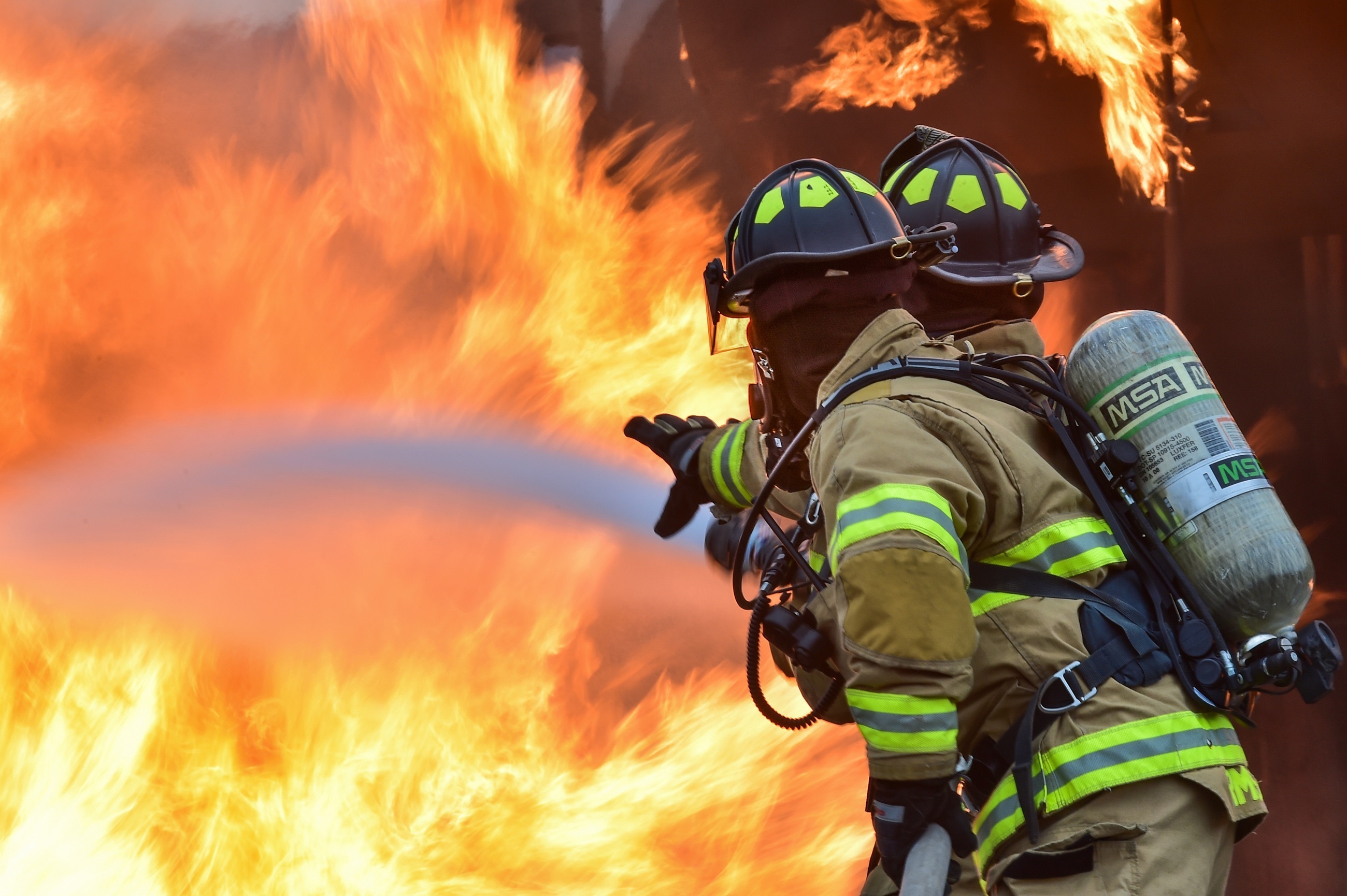
Prep #8: Fire
Fire extinguishers should be on all floors of the house Have you ever read the directions on how to use one or tried it out? It’s not something that in the heat of the moment you want to be perusing through the instructions on how to make it work.
All barns and out buildings also need these in easily accessible locations. Wasn’t it even a cow that started the Great Chicago Fire?
Remember back to the evacuation scenarios. You need to consider how you would react if a neighboring property has a fire that is encroaching on your property, or even more likely, a wildfire entering your area or that just popped up across the street, upwind.
Having long hoses staged and ready to go to douse manageable flames or pre-soak your perimeter fence is a smart decision, and you probably have these lying around your home, garden and pool already.
Fires can start anywhere and sometimes bad things do happen despite all our best efforts. Are your outbuildings covered under your insurance plan? Think about the most important physical assets in your home and make sure they’re accounted for in your policy’s coverage.
Next, ‘what you would grab first’? The family photo album has long been the go-to item, and it may still be. But think Bug-Out Bags, laptops, hard drives with your data backed up, those pet carriers, important documents in that safe upstairs (how fireproof is it really? is it small enough to take with you?).
What can you grab if you had to evacuate your homestead that would help mitigate ‘starting over’ if you lost it all? Emergency Info binders or hard drives can contain all the life info you need to start over. Having an insurance check is a relief, but losing those other things may be paralyzing to you and your family. Make a list of these for the next and final item.
Prep #9: Practice Drills
Most of us probably remember fire drills from school and the fireman talking to you about doing drills at home, but have you done any lately with your family?
Do you have ladders to use from upstairs windows if you have a multi-story home? The practice makes it less freaky for kids and decreases the panic factor slightly since they have at least been through the motions.
Ladders and their use out of windows may be more knowledge than you can or want to impart to little kids, so have a plan with other adults about where these will be kept and who is in charge of getting kids out.
Everyone should also know the rally points where everyone should meet so you know everyone is out of the house and safe.
Does everyone remember the alarm code and password? Is this discussed regularly? I’m super guilty of forgetting the passcodes and need frequent quizzing and drills because it is not something that I normally think about. And I have a million other things going on in my mind, so if I didn’t make up the password, and sometimes even if I do, it just doesn’t stick without repetition.
Have you ever weathered just a regular storm in your tornado shelter? We realized during what has fortunately been our one and only storm shelter experience last year that certain areas of it leaked and needed repair. We also realized more seating would be nice especially if any of the neighbors need to come over. Storm Shelter Party!!!!
If you would have to evacuate animals, practice occasionally haltering and wrangling them as well as designing alleyways or paddocks and methods to make this easier. If the animals know what to do and consider it normal then life is easier whether we are talking about dogs and cats or cattle and goats.
With the exception of maybe extra livestock most of these ideas apply whether you are in an apartment or living on a farm in the country. You can gain and utilize emergency preparedness skills and techniques anywhere.
And if reading this list made you think “Oh crap, I’m soooo not ready for an emergency!” That’s ok. As I was writing, I realized areas that we need to work on to have us better prepared for an emergency too.
Nobody has it all together, but we can identify those gaps and work to fill them in over time as soon as we’re able. The important thing is to take little bites at a time and create a plan so you can move toward better self-sufficiency.
When your homestead and family are prepared for an emergency you find that you don’t worry as much and instead can spend more time enjoying life! And that’s something to celebrate!
